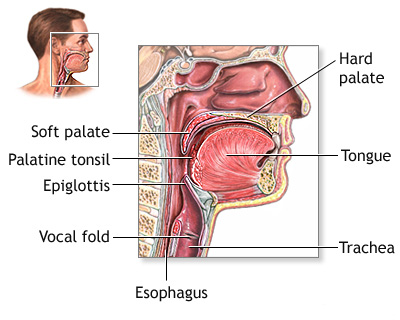Laryngitis
Contents
Causes
Symptoms
Exams and Tests
Treatment
Outlook (Prognosis)
Possible Complications
When to Contact a Medical Professional
Prevention
Laryngitis is swelling and irritation (inflammation) of the voice box (larynx). Laryngitis is usually associated with hoarseness or loss of voice.
Causes

Structures of the throat include the esophagus, trachea, epiglottis and tonsils.
The voice box (larynx) is located at the top of the airway to the lungs (trachea). The larynx contains the vocal cords. When the vocal cords become inflamed or infected, they swell. This can cause hoarseness. Sometimes the airway can get blocked.
The most common form of laryngitis is an infection caused by a virus, such as cold or flu viruses. It may also be caused by:
-
Allergies
-
Bacterial infection
-
Bronchitis
-
Gastroesophageal reflux disease (GERD)
-
Injury
-
Irritants and chemicals
-
Pneumonia
Laryngitis often occurs with an upper respiratory infection.
Several forms of laryngitis occur in children that can lead to dangerous or fatal respiratory blockage. These forms include:
-
Croup
-
Epiglottitis
Symptoms
-
Fever
-
Hoarseness
-
Swollen lymph nodes or glands in the neck
Exams and Tests
A physical exam can find whether hoarseness is caused by a respiratory tract infection.
Patients with hoarseness that lasts more than a month (especially smokers) will need to see an ear, nose, and throat doctor (otolaryngologist) for tests of the throat and upper airway.
Treatment
Common laryngitis is often caused by a virus, therefore antibiotics likely will not help. Your health care provider will make this decision.
Resting your voice helps to reduce inflammation of the vocal cords. A humidifier may soothe the scratchy feeling that comes with laryngitis. Decongestants and pain medicines may relieve the symptoms of an upper respiratory infection.
Outlook (Prognosis)
Laryngitis that is not caused by a serious condition often gets better on its own.
Possible Complications
In rare cases, severe respiratory distress develops. This requires immediate medical attention.
When to Contact a Medical Professional
Call your health care provider if:
-
A small child who is not teething has difficulty breathing, swallowing, or is drooling
-
A child less than 3 months old has hoarseness
-
Hoarseness has lasted for more than 1 week in a child, or 2 weeks in an adult
Prevention
-
Try to avoid people who have upper respiratory infections during cold and flu season.
-
Wash your hands often.
-
Do not strain your voice.
-
Stopping smoking can help prevent tumors of the head and neck or lungs, which can lead to hoarseness.
Source: http://www.nlm.nih.gov/medlineplus/ency/article/001385.htm


 Общие симптомы
Общие симптомы  Голова, зрение, слух, речь
Голова, зрение, слух, речь  Шея и горло
Шея и горло  Грудь, сердце и дыхание
Грудь, сердце и дыхание  Живот, желудок, кишечник
Живот, желудок, кишечник  Конечности, суставы, спина, поясница
Конечности, суставы, спина, поясница  Таз, мочеполовые органы
Таз, мочеполовые органы  Наружные поверхности, кожа, волосы
Наружные поверхности, кожа, волосы